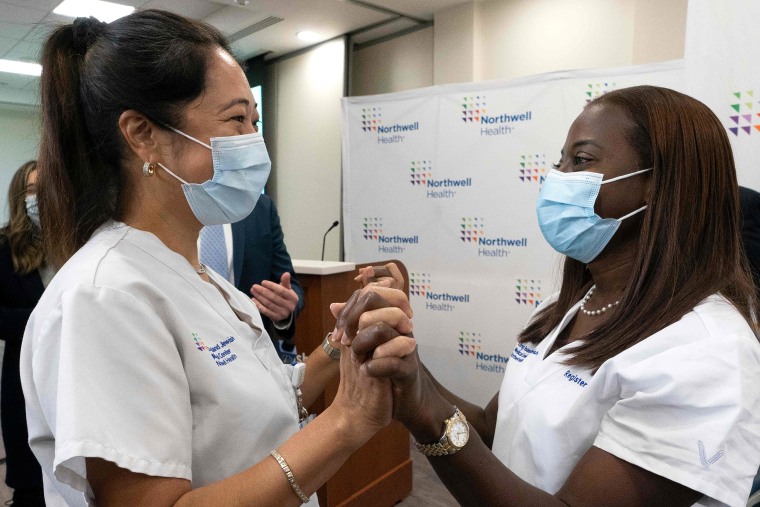Until now, testing, treatment and isolation have been our only tools to help limit the spread of Covid-19 — but vaccination is the means to finally bring it under control. That's because, when a vaccine is used by a majority of people, it may lead to herd immunity for all members of society, protecting even those for whom a vaccine is ineffective or medically contraindicated. But if a significant number of people who would otherwise be healthy enough to receive a vaccination don't get one, the risk of a continuing pandemic goes up dramatically for everyone — especially when the population in question is so deeply embedded in front-line services.
And now, with a nationwide vaccination program for Covid-19 a growing reality, we are about to discover how that scenario will play out — not because of anti-vaxxers, but because of one of the thorniest political issues of our modern era: immigration.
On Friday, Pfizer applied for emergency approval of its Covid-19 vaccine by the Food and Drug Administration; the agency offered it emergency use authorization that evening, and, by Monday morning, front-line health care workers were getting the first vaccinations. Moderna, meanwhile, is likely to follow suit shortly, and several other potential vaccines are coming in 2021.
But once their safety and efficacy are demonstrated by early adopters, we then have to ensure that enough people get it to achieve the level of herd immunity necessary to significantly limit the transmission of the virus.
If a significant number of people who would otherwise be healthy enough to receive a vaccination don't get one, the risk of a continuing pandemic goes up dramatically for everyone.
So if their immigration status causes the estimated 10.7 million undocumented immigrants in the United States enough fear to reduce vaccine adoption, the health of the entire country is compromised.
Nationwide, the unauthorized community accounts for about 3 percent of the population. Estimates find that most live in just 20 major metropolitan areas. For example, over 8 percent of the metro Las Vegas population is estimated to be unauthorized.
While the spread of communicable disease is a global phenomenon, outbreaks are local.
And though the health and well-being of any community have the potential to directly or indirectly affect other populations, the integral role immigrants play in essential services links everyone's health closely with theirs. Over one-quarter of U.S. doctors are foreign-born, and immigrants are disproportionately represented throughout the allied health professions — as well as among scientists involved in vaccine development. The same is true when we consider the essential workers who clean medical facilities, prepare hospital meals and transport patients and supplies.
Outside the medical sector, immigrants are overrepresented in a similar range of occupations deemed essential during the pandemic, including those in the food supply chain (like food service, agriculture and food processing) and in sanitation services (like janitorial services and cleaning). In these jobs, immigrants are more likely to work in situations where contact with many co-workers and customers is unavoidable and physical distancing is difficult.
The concerns about personal contact and a lack of physical distance are multiplied when it comes to unauthorized immigrants, who are disproportionately likely to work in low-paying jobs with high risks of exposure, to live in crowded quarters and to lack access to both general health care and a way to obtain the vaccine.
If unauthorized immigrant communities seek vaccination at disproportionately lower rates than the general population, it will significantly curb our ability to reach herd immunity in many cities.
Moreover, as anti-immigrant groups have spread disinformation — about both the "Chinese virus" and the myth that "immigrants take our jobs" — targeted communities have grown to fear American health care institutions, coming to see them as akin to authorities that could put their lives in America at risk. Unauthorized immigrants thus may be less likely to seek testing for Covid-19, get needed therapeutic treatment if infected and eventually seek vaccination because of the vulnerability that comes with their immigration status.
Furthermore, these people often live in mixed-status households with legal immigrants as well as U.S. citizens, meaning even legal residents and citizens may avoid getting a vaccine or other care for fear of exposing vulnerable family members.
Obviously, every population and community will have specific concerns about a vaccine that public health officials, doctors and advocates will all need to play a role in assuaging. But if, as we can expect, unauthorized immigrant communities seek vaccination at disproportionately lower rates than the general population, it will significantly curb our ability to reach herd immunity in many cities.
Many elements of American life, from the economy to racial justice to the stability and integrity of our political system, are at inflection points, but our pandemic response — including effective implementation of a vaccine — is foundational to all the other elements of our society. A successful vaccination strategy that includes all of us — including our newest Americans — will determine the extent to which a stable public health environment is established and thus whether other pressing issues may be addressed.
To create that "new normal" will take an extra effort to reach out to the most vulnerable and essential members of our communities and persuade them to help both themselves and the rest of us. This entails not only working with organized groups and leaders in these communities, but also reaching out beyond them, to our society at large, and helping everyone recognize — finally — that we are all in this together.



